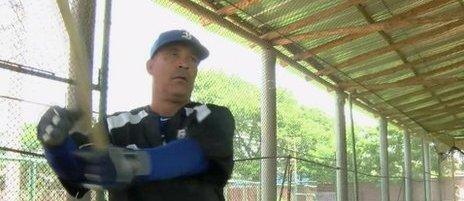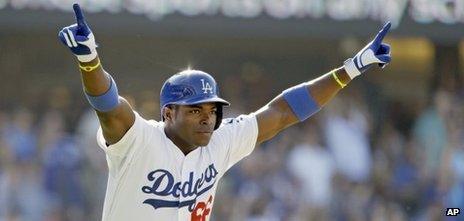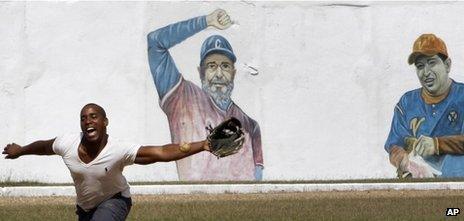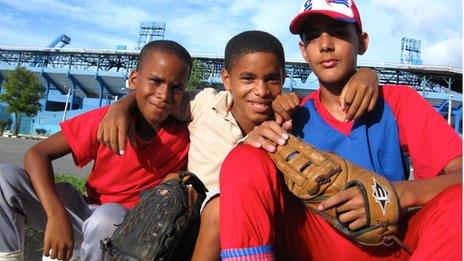Cuban baseball greats vs US-based defectors
- Published
Veteran star players from Havana's biggest baseball club Industriales will travel to Miami in August for the first time ever.
Some of Cuba's greatest baseball stars are about to begin an unprecedented sporting event. The veterans play a series in the US with former team-mates who left the communist island, many playing in the Major League on huge salaries.
The average age of the athletes stretching, pitching and batting in a corner of Havana's Sport City has shot up in recent weeks.
Alongside younger baseball players in training, veterans of Cuba's most famous team, Industriales, were preparing for a unique encounter in the US.
To mark the 50th birthday of the club, they are taking on old team-mates who defected from the communist island.
"It's a historic meeting, it's amazing," laughs Antonio "Tony" Gonzalez, shortly before the group set off for Florida.
Gonzalez was a short-stop for Industriales in the 1960s, and at 75 is the oldest player on the roster.
"I'm like a child, I can hardly sleep waiting for the day we play," he says, in between practice catches.
Cuban baseball was a prime source of players for US Major League teams until Fidel Castro's revolution.
Castro banned professional sport having deemed the money "corrosive".
Today, Cuban athletes are trained for free then paid small state salaries. But the prospect of multi-million dollar contracts overseas has remained alluring for many of them.
Relaxed rules
Industriales pitcher Rene Arocha, who will join the veterans for the reunion match, began the main flood of defections in 1991. He slipped away during a stopover at Miami airport.
Dozens more have followed, often lured by professional scouts.
Two young players fled just last month and it now appears that Cuba's brightest talent, Jose Dariel Abreu of Cienfuegos, has also gone.

Lazaro Vargas now manages the team he starred in for 20 years
The fate of his former Cienfuegos team-mate must be a big draw: Yasiel Puig skipped Cuba last year and signed for the LA Dodgers for $42m (£27m).
Until recently, those who abandoned Cuba were considered traitors and blocked from returning.
The government relaxed the migration laws earlier this year, and a handful of former baseball stars have since visited.
But for most of the Industriales veterans, the 50th anniversary meet in Florida is a long-awaited reunion.
"It will be great to see them again. They're part of our lives and part of the history of baseball, of Industriales," says Lazaro Valle, who played 15 seasons with the team and counts some of the defectors as close friends.
Among those he is keen to catch up with is Orlando "El Duque" Hernandez, who fled Cuba by boat in 1997 and signed with the New York Yankees. Valle has not seen him since.

Yasiel Puig fled the island and is now a huge star in the US
"Why would I think badly of what they did when they're like brothers to me? It was their desire, and I have to respect that," Valle says.
Tony Gonzalez agrees: "When someone leaves, it affects those who remain a lot, but they remain Industriales for ever."
Quiet transformation
Not everyone is keen on such baseball diplomacy.
The US city of Miami is home to large numbers of Cuba exiles and, for many of them, a showcase match for Cuba's top baseball side appears too close to pro-Castro propaganda.
That initially complicated the search for a venue when Florida International University pulled out. But eventually organisers found alternatives.
The series starts with a game in Tampa on Friday.
One of the men striding out in Industriales blue will be Lazaro Vargas. At 49, he is now director of the Havana-based club he starred with for over 20 seasons.

Some defectors believe the Castros have co-opted baseball as propaganda
In his prime he was offered $10m to leave Cuba for the US, but refused.
"I like it here," he shrugs, laughing. Defecting would have meant cutting ties with the island, including family and friends for good.
But Vargas now sees a quiet but radical transformation in Cuban baseball that could help reduce the defections.
This year, three players were contracted out to a Mexican club on deals worth some $10,000 a month, according to Cuba's state-run Sports Institute.
The institute said the players kept "the vast majority" of the money.
In Cuba, a player earns around $20 a month.
All three men are now back with their home clubs in time for the National Series; the experiment will be examined and expanded if it is deemed successful, as the players hope.
"It's a big change," says Vargas. "I think it won't only help prevent people defecting, it will also raise the level of Cuban baseball. If people play overseas and lift their level, the Cuban game will improve too."

Local children are seeing their idols regularly leave for the US
Patriots vs defectors
Defections have certainly played a part in slashing standards: Cuba's national team suffered a disastrous 5-0 defeat in Iowa last month to a US college side.
The US trade embargo on Cuba will presumably keep Major League teams, and the really big money, off-limits.
US sanctions block any financial transactions that enrich the island's government, and active Cuban athletes are still treated as "property" of the state that trained them.
Unless that changes, the impact of any other liberalisation will be limited.
So as they await developments, the Industriales veterans are preparing to take part in their own, ground-breaking initiative: the clash of the Industriales "patriots" against the "defectors".
"It's a bit hard now we're older. The muscles hurt a bit more," Vargas admitted, between still-powerful practice strikes in the nets.
"But I think it will be a good game. They don't want to lose, and neither do we."